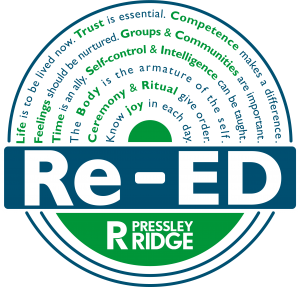 All Pressley Ridge services are guided by a common treatment philosophy called Re-Education. Re-ED focuses on the strengths of each child and family, and holds these beliefs: It is possible to teach competence; change is possible; and the development of trusting relationships with caring, committed adults is the most significant factor in turning around the lives of seriously troubled children.
All Pressley Ridge services are guided by a common treatment philosophy called Re-Education. Re-ED focuses on the strengths of each child and family, and holds these beliefs: It is possible to teach competence; change is possible; and the development of trusting relationships with caring, committed adults is the most significant factor in turning around the lives of seriously troubled children.
Developed by Nicholas Hobbs in the early 1960s, Re-Education (Re-ED) is an ecological model that views the child as inseparable from his family and social context. Treatment impacts the different settings of the child’s life space through careful coordination of care. Re-ED is strength-based, emphasizing children’s assets and the importance of relationship and structure for children and youth. It is holistic, concerned with physical as well as mental health.
TWELVE PRINCIPLES OF RE-EDUCATION
- Life is to be lived now, not in the past, and lived in the future only as a present challenge.
- Trust is essential, trust between child and adult is essential, the foundation on which all other principles rest, the glue that holds teaching and learning together, the beginning point for re-education.
- Competence makes a difference; children and adolescents should be helped to be good at something, and especially at schoolwork.
- Time is an ally, working on the side of growth in a period of development when life has a tremendous forward thrust.
- Self-control can be taught and children and adolescents helped to manage their behavior without the development of psychodynamic insight; and symptoms can and should be controlled by direct address, not necessarily by an uncovering therapy.
- Intelligence can be taught, the cognitive competence of children and adolescents can be considerably enhanced; they can be taught generic skills in the management of their lives as well as strategies for coping with the complex array of demands placed on them by family, school, community, or job; in other words, intelligence can be taught.
- Feelings should be nurtured, shared spontaneously, controlled when necessary, expressed when too long repressed, and explored with trusted others.
- The group is very important to young people; it can be a major source of instruction in growing up.
- Ceremony and ritual give order, stability, and confidence to troubled children and adolescents, whose lives are often in considerable disarray.
- The body is the armature of the self, the physical self around which the psychological self is constructed.
- Communities are important for children and youth, but the uses and benefits of community must be experienced to be learned.
- Know joy each day, in growing up, a child should know some joy in each day and look forward to some joyous event for the morrow.

